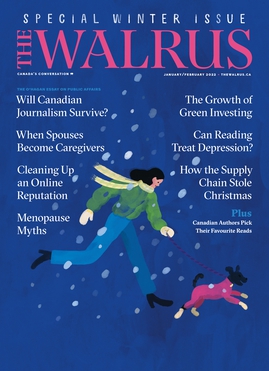
The Walrus
The Walrus is an independent, non-profit Canadian media organization. It is multi-platform and produces an eight-issue-per-year magazine and online editorial content that includes current affairs, fiction, poetry, and podcasts, a national speaker series called The Walrus Talks, and branded content for clients through The Walrus Lab.
For other uses, see Walrus (disambiguation).History[edit]
Creation[edit]
In 2002, David Berlin, a former editor and owner of the Literary Review of Canada, began promoting his vision of a world-class Canadian magazine. This led him to meet with then-Harper's editor Lewis H. Lapham to discuss creating a "Harper's North", which would combine the American magazine with 40 pages of Canadian content.[3] As Berlin searched for funding to create that content, a mutual friend put him in touch with Ken Alexander, a former high school English and history teacher and then senior producer of CBC Newsworld's CounterSpin. Like Berlin, Alexander was hoping to found an intelligent Canadian magazine that dealt with world affairs.
Before long, the Chawkers Foundation, run by Alexander's family, had agreed to provide the prospective magazine with $5 million over five years, and the George Cedric Metcalf Charitable Foundation promised $150,000 for an internship program. This provided enough money to get by without the partnership with Harper's.[3]
Shortly after Berlin and Alexander hired creative director Antonio de Luca and art director Jason Logan to envision the launch of The Walrus.
The magazine launched in September 2003, as an attempt to create a Canadian equivalent to American magazines such as Harper's, The Atlantic Monthly, or The New Yorker. Since then, it has become Canada's leading general interest magazine. Its mandate is:
Finances[edit]
Though The Walrus was initially pledged $1 million annually by the Chawkers Foundation for its first five years, it was unable to access this money without first being recognized as a charitable organization by the Canada Revenue Agency. The Alexander family was forced to support the magazine out of its own pocket until it finally received charitable status in 2005, creating the charitable non-profit Walrus Foundation.[26] In addition to publishing the magazine, the Foundation runs events across Canada, including talks and debates on public policy.[27]
In the relatively small yet geographically large Canadian market, magazines producing long-form journalism have often struggled to stay afloat. Saturday Night, which The Walrus editor John Macfarlane formerly published, lost money continuously despite being a celebrated publication.[28] But as Macfarlane reported in 2011, The Walrus's charitable model, similar to that of Harper's, was thus far sustaining it: donations covered about half of the costs of producing the magazine in 2010, with the traditional revenue streams of circulation and advertising providing the rest.[28] This is all the more important for the magazine because its educational mandate requires that it keep a ratio of no less than 70 percent editorial content to 30 percent advertising.[29]